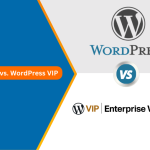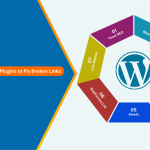Think of a world where no retail purchase is made offline and everything is ordered through the internet. Doesn’t sound too realistic?
Well, prepare to get shocked as Nasdaq has estimated that 95% of all retail purchases will take place online by 2040. That kind of world might be out of the horizons of our imagination, but it’s going to be a reality. Such a cultural shift could open floodgates of opportunities in the e-commerce industry and if you’re thinking of starting an online store, you’re thinking in the right direction.
When it comes to creating an e-commerce store, one of the first things you need is an e-commerce platform that not only serves your current needs but is also adaptive enough for the host of technological advancements coming in the future.
That’s why choosing the right e-commerce platform is quite essential and lays the foundation for a successful e-commerce business. This choice cannot be taken by your ecommerce website design agency, it can only be taken by you, as only you can understand your business better than anybody else.
We cannot take a choice on your behalf, but we can surely help you take the right choice. In this post we will talk about the best e-commerce platforms and their pros & cons, to help you take the best choice for your business. Let’s get going!
1. Magento
Magento is an open-source ecommerce website platform that’s used extensively by high-scale ecommerce businesses. Thanks to its scalability, flexibility, and reliability, giants such as Burger King, Huawei, Pepe Jeans, Liverpool F.C Nike, Procter & Gamble, and Cisco trust Magento for their e-commerce stores.
One of the main factors that make Magento so popular is the (almost) unlimited scope for customization it offers. The launch of Magento 2, it’s expected to take the customer experience to the next level (you’ll need Magento 2 migration service though).

See How Our Experts Can Drive More Traffic to Your Website!
SEO: Boost your rankings and drive more organic traffic today!
Website Design/Development: Create a stunning website that converts visitors into customers.
Paid Media: Reach the right audience at the right time with expertly managed paid media.
Magento is a perfect fit if you’re having (or expecting to have) an enterprise-level e-commerce store. You’ll need to have programmers or a 3rd-party Magento development company for developing and managing your e-commerce store. One thing to note is that the basic version of Magento is free, but the enterprise version will cost you $20,000+ annually.
Pros:
- E-commerce first platform
- Highly scalable for enterprise-level stores
- Highly customizable and reliable
- Easy integrations
- Solid SEO performance
- 1-click selling
- Open-source platform
Cons:
- Requires Magento developer/programmer for customization
- Needs good investment for setting up the store
- Costly themes
- Zero customer support for open-source version
- Costly enterprise version
2. Shopify
Shopify is a popular, full-featured platform in the industry. It’s become a leading solution in the e-commerce domain on the back of two major factors. They are:
-
- Simplicity: Shopify offers unprecedented simplicity and fluidity when it comes to setting up and managing an online store. Even a non-technical person can set up a basic store without much hassle.
- Adaptability: Shopify has kept an owl’s eye on ever-evolving shopping trends and technologies. Whether it’s in-account social media purchases or mobile shopping, Shopify has been amongst the first ones when it comes to adaptation. That could be a huge advantage in the long run.
Moreover, it offers you top-of-the-line 24/7 customer support via phone, email, live chat, and Twitter.
Now, let’s talk about some of the concerns when it comes to Shopify. The biggest concern when it comes to Shopify is “Liquid,” the coding language it’s written in. It’s quite complex and therefore, you’ll need to hire expert Shopify designers.
The second biggest concern when it comes to Shopify is its cost. Although the price of Shopify ranges from $26 to $299, it can go much upward if you add themes, plugins, and features.
Pros:
- E-Commerce first platform
- Unlimited products, orders & sales
- Easy to use
- Hosting and SSL certificates included
- 24/7 support — online, phone, or email
- Seamless app integration
- Super-fast user experience
- 1-click selling
- Allows social selling
- Great themes
Cons:
- Below-par SEO performance
- Doesn’t allow complete customization
- Limited free themes
- Increase in subscription fee when using apps
- Needs developers for customization
3. WooCommerce
When it comes to popularity, no other e-commerce platform comes close to WooCommerce. In fact, WooCommerce accounts for more than 29% of the market share in the e-commerce sphere. The reason why it’s so popular is that it comes as a plugin for WordPress, the most extensively used content management system (CMS) in the world.
If you’re familiar with the WordPress platform, setting up and using WooCommerce is going to be a real cakewalk for you. All you need to do is to add products and configure the settings. But if you aren’t familiar with WordPress, then it could be a bit of a struggle for you.
WooCommerce features a secure payment gateway and shopping card. Both work in an exceedingly smooth manner. And you can easily add extensions for social media, emails, shipping, and a host of other features; you don’t even need to go to WooCommerce developers for it. However, you might need their help in customizing it.
Although WooCommerce comes as an open-source platform, you’ll need little investment to completely integrate the shopping cart of your store.
However, that’s not the biggest concern with WooCommerce. The biggest concern with WooCommerce is its scalability. It starts showing signs of slowing down when the number of sellers, products, buyers, etc. increases. Having said that, it’s an ideal platform if you’re starting out with your e-commerce store and want to stick with WordPress.
Pros:
- Seamless integration with WordPress site
- Open-source platform
- Easy to use and customize
- Availability of plugins
- 1-click selling
- Great benefits in WordPress SEO
Cons:
- Almost zero customer support
- Requires WordPress
- Slows down on scaling up
- Plugin security issues
- Not an e-Commerce first platform
Conclusion: Which E-Commerce Platform Should You Choose?
In the search for “the best,” people often overlook “the right” option. What we mean here is that “A” platform could be offering you the best shopping cart features and benefits in the world but you need to ask yourself whether you really need those benefits or not. Rather than first looking at shopping cart platforms, you should look at many factors such as your present needs, future requirements, your budget, the nature of your business, etc. And then, you should look at available e-commerce platforms. We hope this helps!






